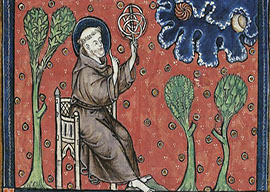
November 03, 2010

Grosseteste was a deeply moral and pious man. He made sure the common people had proper moral instruction in English and that everyone knew the Lord’s Prayer and the Ten Commandments. He fired all of the clergymen under his authority who led immoral lives and was a passionate advocate for religious instruction in his native tongue of Middle English. We have this idea from the 1800s of a scientist as a sort of deranged Promethean character bent on upsetting the natural order, but Grosseteste was practically saintlike, and he was the first scientist. I think this is why we don’t hear more about these guys. They were not what we expect of scientists from popular culture. They were clerics. They were extremely good and moral clerics; examples to the others in a time where there was no shortage of very bad and immoral clerics. They were not the mad scientists of yore, nor did they cut the antinomian figure of modern charlatans such as Dawkins; they were extremely pious figures. Their study of science was a form of prayer or religious devotion, not a way of rebelling against their societies” constraints. Science was invented to give glory to God by examining his natural laws, not to overthrow him from his throne.
Roger Bacon could probably be considered the great systematizer of Grosseteste’s work. He put science in the form and words we know now. He used the terms we know today: observation, hypothesis, experimentation, and independent verification. He also detailed many of the ways in which people can fall into error: resort to authority (a particular peeve of mine), custom, cultural opinion, and pretentious blather. Bacon’s the one medieval scholar you’ve likely heard of, and his contributions to human knowledge were many.
Another important early scientist of the era is Albertus Magnus. The Catholics canonized him as St. Albert the Great. He is considered one of only 33 Doctors of the Church; no Promethean he. One of his most important contributions was the idea that experiments were imperfect, so you could be surer of your conclusions if you did multiple tests on different systems to prove a given natural law. He also discovered arsenic, almost invented photography, and wrote books on mineralogy, botany, physiology, metallurgy, zoology, and a host of other topics. Albertus’s intellectual achievements are so numerous, he makes the entire concept of “Renaissance man” ridiculous. We have no thinking men alive today who can compare to Albertus Magnus, and only a few thinkers in human history can be considered as wide-ranging and important to modern thought. Yet most of you have never heard of him.
Other figures from the era: Petrus Peregrinus, a crusader and monk-knight, wrote detailed accounts of his experimentation with magnets. Witelo of Silesia developed perspective optics, which eventually led to the beauties of Western painting. Johannes de Scartobosco made important contributions to mathematics and astronomy that we take for granted today. William of Ockham“yes, the guy who invented Ockham’s razor”made important contributions to logic and physics.
All of these guys were deeply pious. They didn’t come from the rebellious clerics, of whom there were no shortage in that time. They were religious, but not ignorant mystics; they were their era’s most learned men. They were not provincial rubes as we like to portray the religious today: They were greatly inspired by men from other cultures. They were religious men, not rebels against the Church, as is the modern conception of science opposed to religion. They also came from a time of spirit and prosperity of a magnitude the world hasn’t seen since. In my opinion, this was one of the high points of human history, like the time of Pericles.
Modern atheists with no sense of history like to think of the Church and religious people as the forces of darkness, but in reality, the Catholic Church was the birth of the light of reason. Those religious people are the ultimate heroes of reason; without them, no science would have come into being. The High Middle Ages is also an unsung era because modern people don’t like to think of a historical decline having happened so recently. We safely dismiss the Gothic cathedrals” knightly era as a time of primitive post-Roman rapacious barbarians rather than an era of high culture and achievement. Thinking about this era is painful, as it was the peak before a big decline, the likes of which are only happening now. Europe’s current depopulation is the first one since the end of the High Medieval times. We like to think of history as a story of steady progress from barbarism, and we like to imagine the enemies of progress as all wearing clerical robes, but history is much more complicated. We move forward and we are hurled back by titanic forces, whether disease back then or anomie and apathy today.